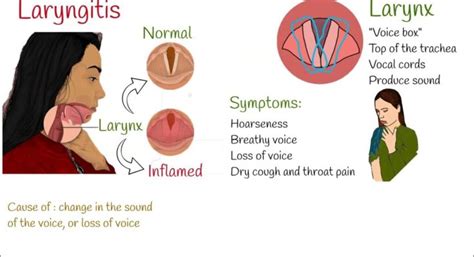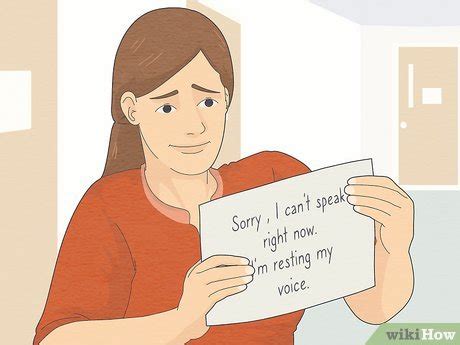Intro
Recover from laryngitis by resting your voice, using vocal care techniques and home remedies to reduce strain, soothe inflammation and promote healing for a speedy vocal cord recovery.
Laryngitis is a common condition that affects the voice, causing hoarseness, soreness, and discomfort in the throat. It can be caused by a variety of factors, including viral or bacterial infections, vocal strain, and allergies. When suffering from laryngitis, it is essential to give your voice the rest it needs to recover. In this article, we will explore the importance of resting your voice for laryngitis recovery and provide tips on how to do so effectively.
Resting your voice is crucial for laryngitis recovery because it allows the vocal cords to heal and recover from the strain and inflammation caused by the condition. When you have laryngitis, your vocal cords are swollen and irritated, making it painful to speak or sing. By giving your voice a break, you can help reduce the swelling and promote healing. Additionally, resting your voice can help prevent further strain and damage to the vocal cords, which can lead to more severe and long-lasting problems.
Laryngitis can be a frustrating and debilitating condition, especially for individuals who rely on their voice for their profession or daily activities. However, with proper rest and care, it is possible to recover from laryngitis and regain a healthy and strong voice. In the following sections, we will delve deeper into the importance of resting your voice for laryngitis recovery and provide practical tips on how to do so.
Understanding Laryngitis

Causes of Laryngitis
Laryngitis can be caused by a variety of factors, including: * Viral or bacterial infections, such as the common cold or flu * Vocal strain, such as shouting or screaming * Allergies, such as hay fever or sinusitis * Acid reflux, which can cause stomach acid to flow up into the throat and irritate the vocal cords * Environmental factors, such as exposure to smoke or pollutionImportance of Resting Your Voice

Benefits of Resting Your Voice
The benefits of resting your voice for laryngitis recovery include: * Reduced swelling and inflammation in the vocal cords * Promoted healing and recovery of the vocal cords * Prevention of further strain and damage to the vocal cords * Improved voice quality and reduced hoarseness * Reduced risk of complications, such as vocal cord nodules or polypsTips for Resting Your Voice

Additional Tips
Additional tips for resting your voice include: * Using a humidifier to add moisture to the air and help soothe the vocal cords * Avoiding spicy or acidic foods and drinks that can irritate the vocal cords * Getting plenty of sleep and avoiding fatigue * Avoiding stress and anxiety, which can exacerbate laryngitis symptoms * Considering voice therapy or vocal coaching to help improve voice quality and reduce strain on the vocal cordsHome Remedies for Laryngitis

Natural Remedies
Natural remedies for laryngitis include: * Honey, which has antibacterial and anti-inflammatory properties that can help soothe the vocal cords * Slippery elm, which can help reduce inflammation and promote healing in the throat and vocal cords * Marshmallow root, which can help soothe and protect the mucous membranes in the throat and vocal cords * Echinacea, which can help boost the immune system and reduce the severity of laryngitis symptomsMedical Treatment for Laryngitis

When to Seek Medical Attention
It is essential to seek medical attention if you experience any of the following symptoms: * Severe hoarseness or loss of voice * Difficulty breathing or swallowing * Severe throat pain or discomfort * Fever or chills * White patches or lesions on the vocal cordsWhat are the symptoms of laryngitis?
+The symptoms of laryngitis include hoarseness, soreness, and discomfort in the throat, as well as difficulty speaking or singing.
How can I rest my voice effectively?
+To rest your voice effectively, avoid speaking or singing as much as possible, use a whispery voice instead of a loud voice, and stay hydrated by drinking plenty of water.
What are some home remedies for laryngitis?
+Home remedies for laryngitis include drinking plenty of fluids, using a warm compress or gargling with salt water, and sucking on lozenges or cough drops.
In conclusion, resting your voice is essential for laryngitis recovery. By giving your voice a break and avoiding strain and irritation, you can help promote healing and reduce the risk of complications. Additionally, home remedies and medical treatment can help alleviate symptoms and promote recovery. We hope this article has provided you with valuable information and tips on how to rest your voice effectively and recover from laryngitis. If you have any further questions or concerns, please do not hesitate to comment below or share this article with others who may be suffering from laryngitis.
